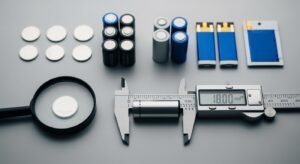
A Guide to Choosing Speaker Lithium Batteries
Find the right lithium batteries for your speaker by matching voltage (V), capacity (mAh), and size. This guide ensures your
11 лет производства литиевых батарей

Find the right lithium batteries for your speaker by matching voltage (V), capacity (mAh), and size. This guide ensures your

Want to improve battery life on your wireless speaker? Keep the volume at 60-80%, turn off extra features like LED

Want to improve battery life for your BLE device? Adjusting advertising intervals, using slave latency, and enabling deep sleep modes

Choose the right lithium batteries for your BLE device by analyzing its power profile, peak current, and voltage needs. Match

Fix BLE devices battery drain caused by aggressive settings, firmware, or temperature. Adjusting connection parameters and transmit power extends battery

For electric scooters, lithium-ion is the best battery type. Choose NMC for high performance and range or LFP (LiFePO4) for

Select the best robot lithium batteries by matching chemistry (LiFePO4 or NMC) to your task and defining power, size, and

For most industrial robots, LiFePO₄ (LFP) batteries are the best choice, offering superior safety and a long lifespan. NMC batteries

Want to improve battery life for your electric scooter? Use smart charging habits like the 20-80 rule, store it at

Prevent costly industrial robot battery failure caused by overheating, improper charging, and physical damage. Use advanced BMS and thermal management

The best battery type for home solar is Lithium Iron Phosphate (LFP). It offers a longer lifespan, more usable energy,

Choosing the right lithium batteries for your electric scooter? Match the voltage, pick the right capacity (Ah) for your range,
Компания Guangdong Yungbang New Energy Co., Ltd.
Copyright © 2013. Все права защищены.